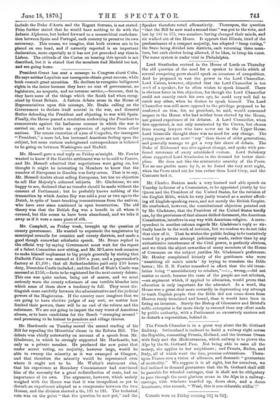Mr. Hardcastle on Tuesday moved the second reading of his
Bill for repealing the Minorities' clause in the Reform Bill. The -debate was chiefly noteworthy on account of a speech from Mr. Gladstone, in which be strongly supported Mr. Hardcastle, but -only as a private member. He produced the new point that under secret voting, no majority, however large, would be -able to swamp the minority as it was swamped at Glasgow, -and that therefore the minority would be represented even where it ought not to be. Mr. Walter's statement also, that his experience as Boundary Commissioner had convinced him of the necessity for a great redistribution of seats, had an importance of its own. The argument, however, which mainly weighed with the House was that it was inexpedient as yet to disturb an experiment adopted as a compromise between the two Houses, and the division showed a tie, 181 to 181. The technical vote was on the point "that the question be now put," and the
Speaker therefore voted affirmatively. Thereupon, the question "that the Bill be now re.ad a second time" was put to the vote, and lost by 183 to 175, two members having changed their minds, and six walked out of the House. It appears that Illinois, tired of the predominance of a compact majority, has adopted "lump voting," the State being divided into districts, each returning three mem- bers, but each elector being allowed, if he likes, to lump his votes. The same system is under trial in Philadelphia.






























 Previous page
Previous page